江苏省如皋中学2019-2020学年高一下学期教学质量调研(一)英语试题
- 格式:docx
- 大小:233.61 KB
- 文档页数:14
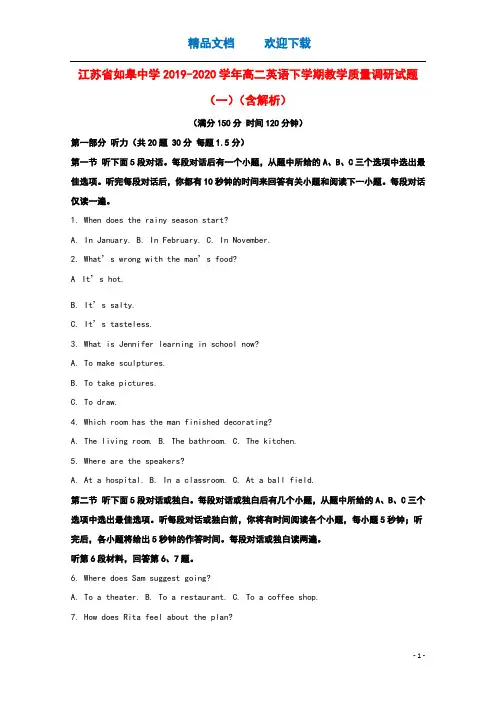
江苏省如皋中学2019-2020学年高二英语下学期教学质量调研试题(一)(含解析)(满分150分时间120分钟)第一部分听力(共20题 30分每题1.5分)第一节听下面5段对话。
每段对话后有一个小题,从题中所给的A、B、C三个选项中选出最佳选项。
听完每段对话后,你都有10秒钟的时间来回答有关小题和阅读下一小题。
每段对话仅读一遍。
1. When does the rainy season start?A. In January.B. In February.C. In November.2. What’s wrong with the man’s food?A. It’s hot.B. It’s salty.C. It’s tasteless. 3. What is Jennifer learning in school now? A. To make sculptures. B. To take pictures. C. To draw. 4. Which room has the man finished decorating? A. The living room. B. The bathroom. C. The kitchen. 5. Where are the speakers? A. At a hospital. B. In a classroom. C. At a ball field. 第二节听下面5段对话或独白。
每段对话或独白后有几个小题,从题中所给的A、B、C三个选项中选出最佳选项。
听每段对话或独白前,你将有时间阅读各个小题,每小题5秒钟;听完后,各小题将给出5秒钟的作答时间。
每段对话或独白读两遍。
听第6段材料,回答第6、7题。
6. Where does Sam suggest going?A. To a theater.B. To a restaurant.C. To a coffee shop.7. How does Rita feel about the plan?A. Excited.B. Indifferent.C. Disappointed.听第7段材料,回答第8、9题。
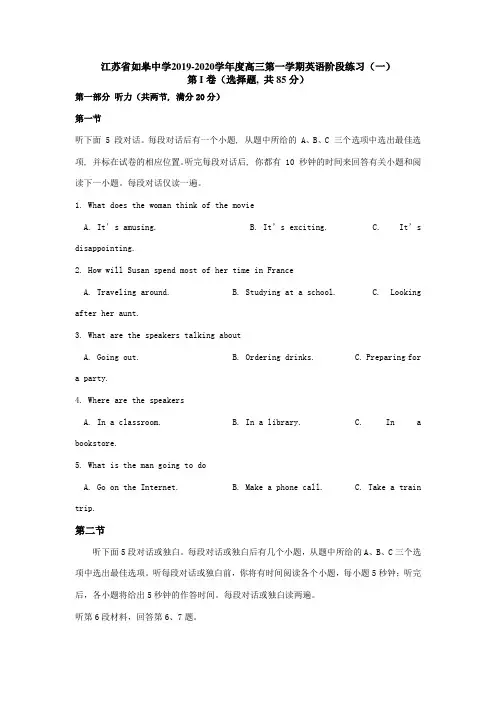
江苏省如皋中学2019-2020学年度高三第一学期英语阶段练习(一)第I卷(选择题, 共85分)第一部分听力(共两节, 满分20分)第一节听下面 5 段对话。
每段对话后有一个小题, 从题中所给的 A、B、C 三个选项中选出最佳选项, 并标在试卷的相应位置。
听完每段对话后, 你都有 10 秒钟的时间来回答有关小题和阅读下一小题。
每段对话仅读一遍。
1. What does the woman think of the movieA. It’s amusing.B. It’s ex citing.C. It’s disappointing.2. How will Susan spend most of her time in FranceA. Traveling around.B. Studying at a school.C. Looking after her aunt.3. What are the speakers talking aboutA. Going out.B. Ordering drinks.C. Preparing fora party.4. Where are the speakersA. In a classroom.B. In a library.C. In a bookstore.5. What is the man going to doA. Go on the Internet.B. Make a phone call.C. Take a train trip.第二节听下面5段对话或独白。
每段对话或独白后有几个小题,从题中所给的A、B、C三个选项中选出最佳选项。
听每段对话或独白前,你将有时间阅读各个小题,每小题5秒钟;听完后,各小题将给出5秒钟的作答时间。
每段对话或独白读两遍。
听第6段材料,回答第6、7题。
6. What is the woman looking forA. An information office.B. A police station.C. A shoe repair shop.7. What is the Town Guide according to the manA. A brochure.B. A newspaper.C. A map.听第7段材料,回答第8、9题。
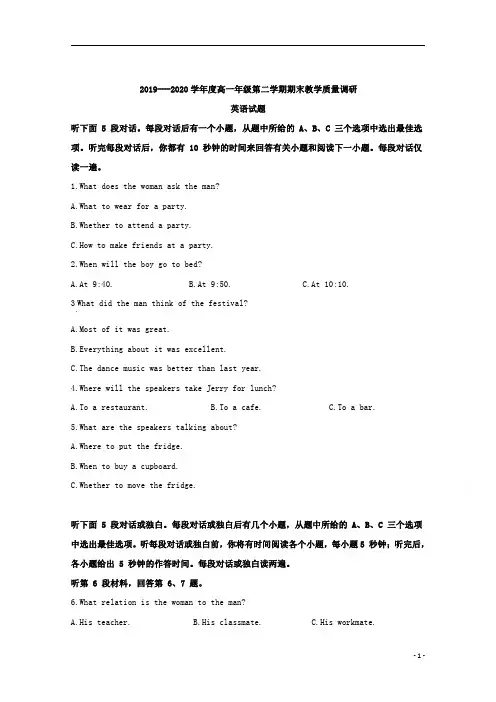
2019---2020学年度高一年级第二学期期末教学质量调研英语试题听下面5段对话。
每段对话后有一个小题,从题中所给的A、B、C三个选项中选出最佳选项。
听完每段对话后,你都有10秒钟的时间来回答有关小题和阅读下一小题。
每段对话仅读一遍。
1.What does the woman ask the man?A.What to wear for a party.B.Whether to attend a party.C.How to make friends at a party.2.When will the boy go to bed?A.At9:40.B.At9:50.C.At10:10.3.What did the man think of the festival?A.Most of it was great.B.Everything about it was excellent.C.The dance music was better than last year.4.Where will the speakers take Jerry for lunch?A.To a restaurant.B.To a cafe.C.To a bar.5.What are the speakers talking about?A.Where to put the fridge.B.When to buy a cupboard.C.Whether to move the fridge.听下面5段对话或独白。
每段对话或独白后有几个小题,从题中所给的A、B、C三个选项中选出最佳选项。
听每段对话或独白前,你将有时间阅读各个小题,每小题5秒钟;听完后,各小题给出5秒钟的作答时间。
每段对话或独白读两遍。
听第6段材料,回答第6、7题。
6.What relation is the woman to the man?A.His teacher.B.His classmate.C.His workmate.7.Where is Queensland?A.In Canada.B.In America.C.In Australia.听第7段材料,回答第8、9题。
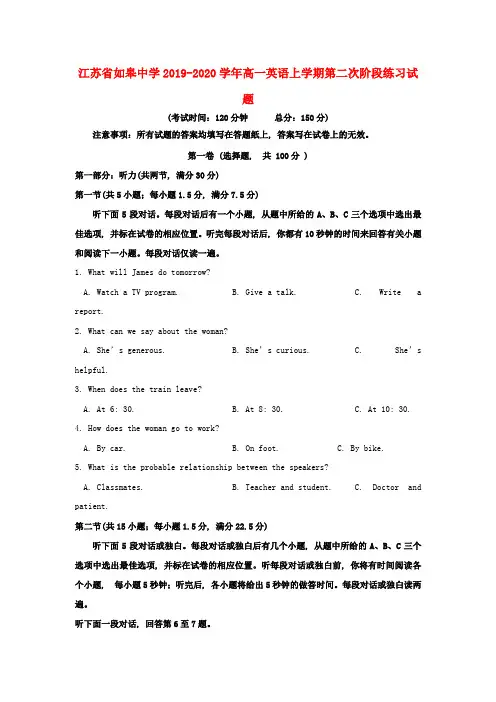
江苏省如皋中学2019-2020学年高一英语上学期第二次阶段练习试题(考试时间:120分钟总分:150分)注意事项:所有试题的答案均填写在答题纸上, 答案写在试卷上的无效。
第一卷 (选择题, 共 100分 )第一部分:听力(共两节, 满分30分)第一节(共5小题;每小题1.5分, 满分7.5分)听下面5段对话。
每段对话后有一个小题, 从题中所给的A、B、C三个选项中选出最佳选项, 并标在试卷的相应位置。
听完每段对话后, 你都有10秒钟的时间来回答有关小题和阅读下一小题。
每段对话仅读一遍。
1. What will James do tomorrow?A. Watch a TV program.B. Give a talk.C. Write a report.2. What can we say about the woman?A. She’s generous.B. She’s curious.C. She’s helpful.3. When does the train leave?A. At 6: 30.B. At 8: 30.C. At 10: 30.4. How does the woman go to work?A. By car.B. On foot.C. By bike.5. What is the probable relationship between the speakers?A. Classmates.B. Teacher and student.C. Doctor and patient.第二节(共15小题;每小题1.5分, 满分22.5分)听下面5段对话或独白。
每段对话或独白后有几个小题, 从题中所给的A、B、C三个选项中选出最佳选项, 并标在试卷的相应位置。
听每段对话或独白前, 你将有时间阅读各个小题, 每小题5秒钟;听完后, 各小题将给出5秒钟的做答时间。
每段对话或独白读两遍。
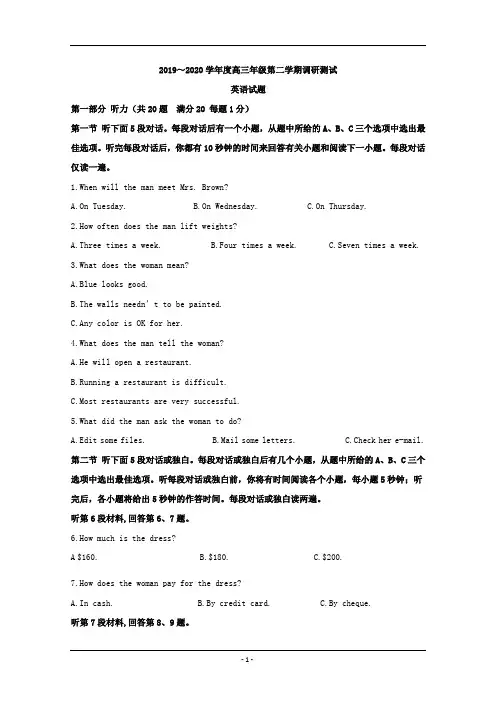
2019~2020学年度高三年级第二学期调研测试英语试题第一部分听力(共20题满分20 每题1分)第一节听下面5段对话。
每段对话后有一个小题,从题中所给的A、B、C三个选项中选出最佳选项。
听完每段对话后,你都有10秒钟的时间来回答有关小题和阅读下一小题。
每段对话仅读一遍。
1.When will the man meet Mrs. Brown?A.On Tuesday.B.On Wednesday.C.On Thursday.2.How often does the man lift weights?A.Three times a week.B.Four times a week.C.Seven times a week.3.What does the woman mean?A.Blue looks good.B.The walls needn’t to be painted.C.Any color is OK for her.4.What does the man tell the woman?A.He will open a restaurant.B.Running a restaurant is difficult.C.Most restaurants are very successful.5.What did the man ask the woman to do?A.Edit some files.B.Mail some letters.C.Check her e-mail. 第二节听下面5段对话或独白。
每段对话或独白后有几个小题,从题中所给的A、B、C三个选项中选出最佳选项。
听每段对话或独白前,你将有时间阅读各个小题,每小题5秒钟;听完后,各小题将给出5秒钟的作答时间。
每段对话或独白读两遍。
听第6段材料,回答第6、7题。
6.How much is the dress?A.$160.B.$180.C.$200. 7.How does the woman pay for the dress? A.In cash. B.By credit card. C.By cheque. 听第7段材料,回答第8、9题。
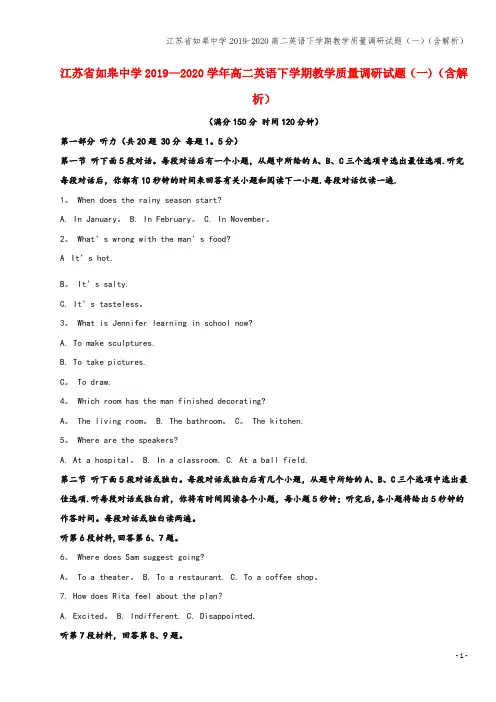
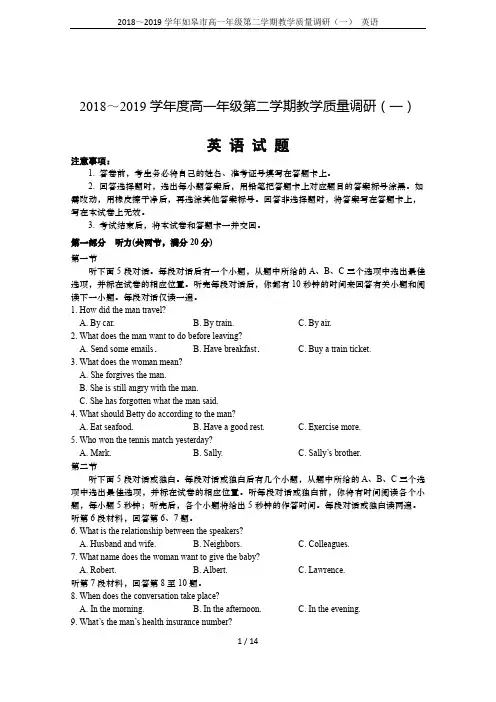
2018~2019学年度高一年级第二学期教学质量调研(一)英语试题注意事项:1. 答卷前,考生务必将自己的姓名、准考证号填写在答题卡上。
2. 回答选择题时,选出每小题答案后,用铅笔把答题卡上对应题目的答案标号涂黑。
如需改动,用橡皮擦干净后,再选涂其他答案标号。
回答非选择题时,将答案写在答题卡上,写在本试卷上无效。
3. 考试结束后,将本试卷和答题卡一并交回。
第一部分听力(共两节,满分20分)第一节听下面5段对话。
每段对话后有一个小题,从题中所给的A、B、C三个选项中选出最佳选项,并标在试卷的相应位置。
听完每段对话后,你都有10秒钟的时间来回答有关小题和阅读下一小题。
每段对话仅读一遍。
1. How did the man travel?A. By car.B. By train.C. By air.2. What does the man want to do before leaving?A. Send some emails.B. Have breakfast.C. Buy a train ticket.3. What does the woman mean?A. She forgives the man.B. She is still angry with the man.C. She has forgotten what the man said.4. What should Betty do according to the man?A. Eat seafood.B. Have a good rest.C. Exercise more.5. Who won the tennis match yesterday?A. Mark.B. Sally.C. Sally’s brother.第二节听下面5段对话或独白。
每段对话或独白后有几个小题,从题中所给的A、B、C三个选项中选出最佳选项,并标在试卷的相应位置。
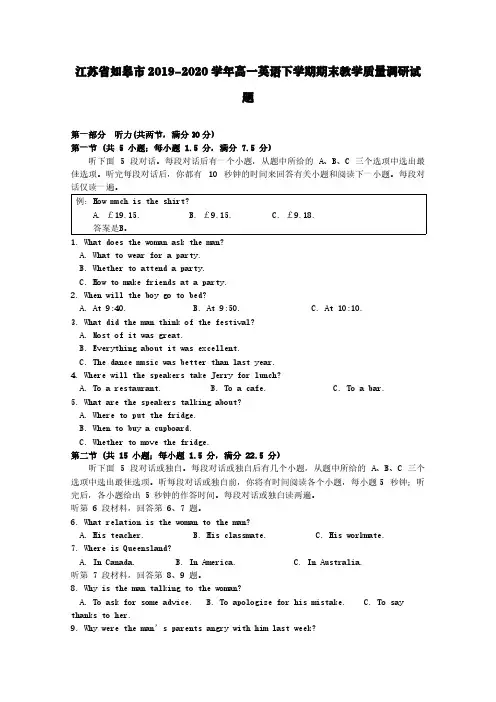
江苏省如皋市2019-2020学年高一英语下学期期末教学质量调研试题第一部分听力(共两节,满分30分)第一节 (共 5 小题;每小题 1.5 分,满分 7.5 分)听下面 5 段对话。
每段对话后有一个小题,从题中所给的A、B、C 三个选项中选出最佳选项。
听完每段对话后,你都有10 秒钟的时间来回答有关小题和阅读下一小题。
每段对话仅读一遍。
例:How much is the shirt?A. £19.15.B. £9.15.C. £9.18.答案是B。
1. What does the woman ask the man?A. What to wear for a party.B. Whether to attend a party.C. How to make friends at a party.2. When will the boy go to bed?A. At 9:40.B. At 9:50.C. At 10:10.3. What did the man think of the festival?A. Most of it was great.B. Everything about it was excellent.C. The dance music was better than last year.4. Where will the speakers take Jerry for lunch?A. To a restaurant.B. To a cafe.C. To a bar.5. What are the speakers talking about?A. Where to put the fridge.B. When to buy a cupboard.C. Whether to move the fridge.第二节 (共 15 小题;每小题 1.5 分,满分 22.5 分)听下面 5 段对话或独白。
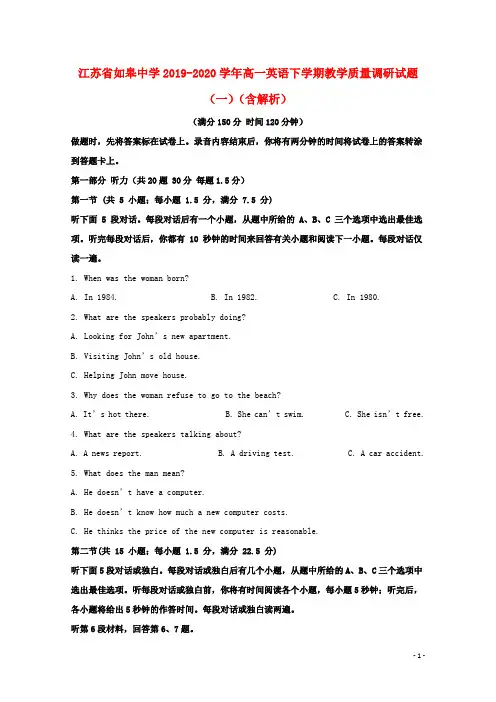
江苏省如皋中学2019-2020学年高一英语下学期教学质量调研试题(一)(含解析)(满分150分时间120分钟)做题时,先将答案标在试卷上。
录音内容结束后,你将有两分钟的时间将试卷上的答案转涂到答题卡上。
第一部分听力(共20题 30分每题1.5分)第一节 (共 5 小题;每小题 1.5 分,满分 7.5 分)听下面 5 段对话。
每段对话后有一个小题,从题中所给的 A、B、C 三个选项中选出最佳选项。
听完每段对话后,你都有 10 秒钟的时间来回答有关小题和阅读下一小题。
每段对话仅读一遍。
1. When was the woman born?A. In 1984.B. In 1982.C. In 1980.2. What are the speakers probably doing?A. Looking for John’s new apartment.B. Visiting John’s old house.C. Helping John move house.3. Why does the woman refuse to go to the beach?A. It’s hot there.B. She can’t swim.C. She isn’t free.4. What are the speakers talking about?A. A news report.B. A driving test.C. A car accident.5. What does the man mean?A. He doesn’t have a computer.B. He doesn’t know how much a new computer costs.C. He thinks the price of the new computer is reasonable.第二节(共 15 小题;每小题 1.5 分,满分 22.5 分)听下面5段对话或独白。
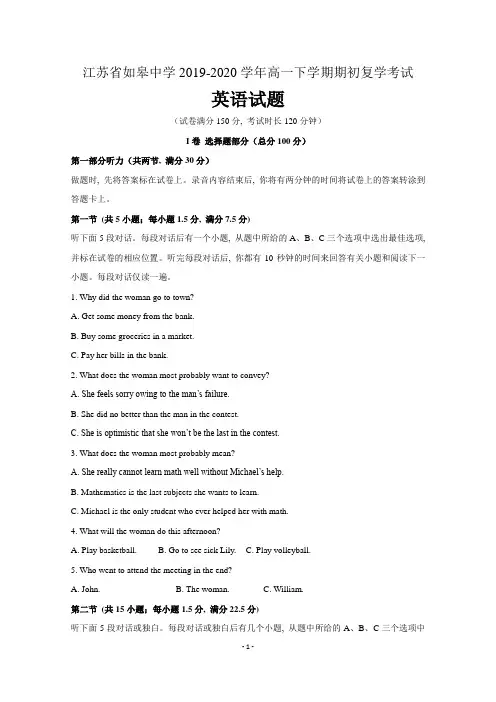
江苏省如皋中学2019-2020学年高一下学期期初复学考试英语试题(试卷满分150分, 考试时长120分钟)I卷选择题部分(总分100分)第一部分听力(共两节, 满分30分)做题时, 先将答案标在试卷上。
录音内容结束后, 你将有两分钟的时间将试卷上的答案转涂到答题卡上。
第一节(共5小题;每小题1.5分, 满分7.5分)听下面5段对话。
每段对话后有一个小题, 从题中所给的A、B、C三个选项中选出最佳选项, 并标在试卷的相应位置。
听完每段对话后, 你都有10秒钟的时间来回答有关小题和阅读下一小题。
每段对话仅读一遍。
1. Why did the woman go to town?A. Get some money from the bank.B. Buy some groceries in a market.C. Pay her bills in the bank.2. What does the woman most probably want to convey?A. She feels sorry owing to the man’s failure.B. She did no better than the man in the contest.C. She is optimistic that she won’t be the last in the contest.3. What does the woman most probably mean?A. She really cannot learn math well without Michael’s help.B. Mathematics is the last subjects she wants to learn.C. Michael is the only student who ever helped her with math.4. What will the woman do this afternoon?A. Play basketball.B. Go to see sick Lily.C. Play volleyball.5. Who went to attend the meeting in the end?A. John.B. The woman.C. William.第二节(共15小题;每小题1.5分, 满分22.5分)听下面5段对话或独白。
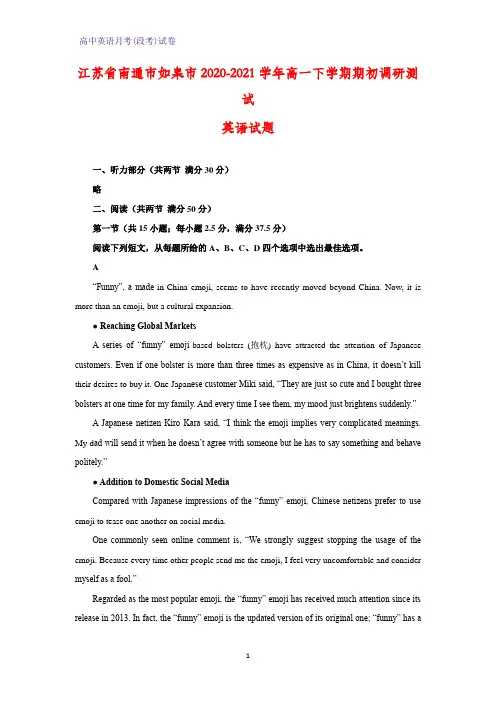
江苏省南通市如皋市2020-2021学年高一下学期期初调研测试英语试题一、听力部分(共两节满分30分)略二、阅读(共两节满分50分)第一节(共15小题;每小题2.5分,满分37.5分)阅读下列短文,从每题所给的A、B、C、D四个选项中选出最佳选项。
A“Funny”, a made-in-China emoji, seems to have recently moved beyond China. Now, it is more than an emoji, but a cultural expansion.● Reaching Global MarketsA series of “funny” emoji-based bolsters (抱枕) have attracted the attention of Japanese customers. Even if one bolster is more than three times as expensive as in China, it doesn’t kill their desires to buy it. One Japan ese customer Miki said, “They are just so cute and I bought three bolsters at one time for my family. And every time I see them, my mood just brightens suddenly.”A Japanese netizen Kiro Kara said, “I think the emoji implies very complicated meanings. My d ad will send it when he doesn’t agree with someone but he has to say something and behave politely.”● Addition to Domestic Social MediaCompared with Japanese impressions of the “funny” emoji, Chinese netizens prefer to use emoji to tease one another on social media.One commonly seen online comment is, “We strongly suggest stopping the usage of the emoji. Because every time other people send me the emoji, I feel very uncomfortable and consider myself as a fool.”Regarded as the most popular emoji, the “funny” emoji has received much attention since its release in 2013. In fact, the “funny” emoji is the updated version of its original one; “funny” has asmiley mouth, two eyebrows and a naughty look. All these characteristics present users a sense of satire (讽刺).● In Everyday Use AbroadIt's not the first time the Chinese emoji takes the world stage. Earlier this year, one emoji from the Chinese basketball celebrity Yao Ming has been spread through the Middle East region. In a city in southern Egypt, Yao’s sm iling emoji has appeared frequently in local traffic signs to remind people the road ahead is one-way. Many locals do not know Yao Ming but are familiar with his emoji and nickname “Chinese Funny Face”.As a new online language, emojis have become a necess ary part of people’s daily life, helping people express their views in a more vivid and precise way. Also, it can help foreigners learn about Chinese culture. But how to properly use “the fifth innovation in China” without hurting others and turn them into commercial advantages still need answers.1. Why do the bolsters attract Miki’s attention?A. They are inexpensive.B. They help reach an agreement.C. They help brighten the mood.D. They are helpful to express desire.2. According to the passage, which of following is the latest “funny” emoji?A. B.C. D.3. The main purpose of the text is to .A. promote the emoji worldwideB. teach us how to use the emojiC. explain the meaning of emojiD. show us the popularity of the emoji『答案』1. C 2. A 3. D『解析』这是一篇说明文。
江苏省如皋中学2019~2020学年度第二学期阶段考试高一英语202005(满分150分考试时间120分钟)第一部分,听力(共两节, 满分30分)第一节(共5小题;每小题1.5分,满分7.5分)听下面5段对话。
每段对话后有一个小题,从题中所给的A、B、C三个选项中选出最佳选项,并标在试卷的相应位置。
听完每段对话后,你都有10秒钟的时间来回答有关小题和阅读下一小题。
每段对话仅读一遍。
1.Where are the two speakers?A. In an office.B. At th e doctor’s.C. In a restaurant.2.What does the woman think of Professor Johnson’s lectures?A. Great.B. Just so-so.C. Hard.3.How will the man go to the zoo?A. By bus.B. On foot.C. By taxi.4.What are the speakers doing?A. They are greeting each other.B. They are talking over the telephone.C. They are saying goodbye to each other.5.What do you know about the woman?A. She doesn’t have a computer.B. Her computer is the latest model.C. She has fallen behind others at work.第二节(共15小题;每小题1.5分,满分22.5分)听下面5 段对话或独白。
每段对话或独白后有几个小题,从题中所给的A、B、C三个选项中选出最佳选项,并标在试卷的相应位置。
听每段对话或独白前,你将有时间阅读各个小题,每小题 5 秒钟;听完后,各小题将给出 5 秒钟的作答时间。
江苏省如皋中学2019-2020学年高二英语下学期教学质量调研试题(一)(满分150分时间120分钟)第一部分听力(共20题 30分每题1.5分)第一节听下面5段对话。
每段对话后有一个小题,从题中所给的A、B、C三个选项中选出最佳选项。
听完每段对话后,你都有10秒钟的时间来回答有关小题和阅读下一小题。
每段对话仅读一遍。
1. When does the rainy season start?A. In January.B. In February.C. In November.2. What’s wrong with the man’s food?A. It’s hot.B. It’s salty.C. It’s tasteless.3. What is Jennifer learning in school now?A. To make sculptures.B. To take pictures.C. To draw.4. Which room has the man finished decorating?A. The living room.B. The bathroom.C. The kitchen.5. Where are the speakers?A. At a hospital.B. In a classroom.C. At a ball field.第二节听下面5段对话或独白。
每段对话或独白后有几个小题,从题中所给的A、B、C三个选项中选出最佳选项。
听每段对话或独白前,你将有时间阅读各个小题,每小题5秒钟;听完后,各小题将给出5秒钟的作答时间。
每段对话或独白读两遍。
听第6段材料,回答第6、7题。
6. Where does Sam suggest going?A. To a theater.B. To a restaurant.C. To a coffee shop.7. How does Rita feel about the plan?A. Excited.B. Indifferent.C. Disappointed.听第7段材料,回答第8、9题。
江苏省如皋市2019-2020学年高一英语下学期教学质量调研试题(二)第一部分:听力(共两节,满分30分)第一节 (共 5 小题;每小题 1.5分,满分 7.5 分)听下面 5 段对话。
每段对话后有一个小题,从题中所给的 A、B、C 三个选项中选出最佳选项。
听完每段对话后,你都有 10 秒钟的时间来回答有关小题和阅读下一小题。
每段对话仅读一遍。
1. Where is the Teen Eye Building?A. On Madison Street.B. Across from a museum.C. At the end of 7th Street.2. What will the woman do next?A. Have a shower.B. Clean her teeth.C. Wash her face.3. What does the woman think of living in a city?A. Exciting.B. Convenient.C. Dangerous.4. What is the woman doing?A. Learning Spanish.B. Having an interview.C. Giving an English class.5. What are the speakers mainly discussing?A. What the man will do on the weekend.B. How the man will get to Washington.C. When the man will go to work.第二节 (共 15 小题;每小题 1.5 分,满分 22.5 分)听下面 5 段对话或独白。
每段对话或独白后有几个小题,从题中所给的 A、B、C 三个选项中选出最佳选项。
听每段对话或独白前,你将有时间阅读各个小题,每小题5 秒钟;听完后,各小题给出 5 秒钟的作答时间。
2019-2020年高一下学期第一次质量抽查英语试题含答案I. Listening prehension. (20%)Section A Short Conversations (10%)Directions: In Section A, you will hear ten short conversations between two speakers. At the end of each conversation, a question will be asked about what was said. The conversation and the question will be spoken only once. After you hear a conversation and the question about it, read the four possible answers on your paper, and decide which one is the best answer to the question you have heard.1. A. Kate’s baby in the youngest. B. The man’s baby in the youngest.C. The woman’s baby is the youngest.D. The man’s sister’s baby is the youngest2. A. He will go on to higher education B. He will work for his father.C. He will make some other choice.D. He has to pass another test.3. A. He must hand in a report on the museum.B. He is too busy to go along.C. He has to wash his hands first.D. He has read a full account of the museum.4. A. No, all the rooms are taken B. Yes, there are some spare rooms.C. Yes, there is a double room.D. Yes, there is a single room.5. A. 60 B. 57 C. 65 D. 536. A. Green B. Light blue C. Yellow D. Brown7. A. At 5:00 B. At 4:20 C. At 3:00 D. At 2:008. A. It is going to rain B. It has just started rainingC. It has been raining for some timeD. The rain has stopped.9. A. A new tendency. B. A disease that is spreadingC. Something that spreads over the entire body.D. A recent fire in the area.10. A. She visits hotels. B. She tours museumsC. She walks through townD. She doesn’t eat till evening.Section B Passages (6%)Directions: In Section B, you will hear two short passages, and you will be asked three questions on each of the passages. The passages will be read twice, but the questions will be spoken only once. When you hear a question, read the four possible answers on your paper and decide which one would be the best answer to the question you have heard.Questions 11 through 13 are based on the following passage.11. A. She had the head of a cat B. She was an animal.C. She was prettyD. She had wings.12. A. They loved doing something for the person.B. They believed the person could live another life.C. They thought the person would sleep peacefully.D. They wished the person to e back home.13. A. Food and drink B. A mask made of jewelry.C. Huge structuresD. Things needed in life.Questions 14 through 16 are based on the following passage.14. A. He wanted to take a shortcut B. It was getting dark.C. There were no lights aroundD. He didn’t like the owner.15. A. Being blamed B. Being attacked C. Being caught D. Closing the gate.16. A. The land owner B. His own shadow C. A strange sound D. His own fear.Section C Longer Conversations (4%)Directions:In Section C, you will hear two longer conversations. The conversations will be read twice. After you hear each conversation, you are required to fill in the numbered blanks with the information you have heard.II. Grammar and Vocabulary (33%)Section A 18%Directions: Beneath each of the following sentences there are four choices marked A, B, C or D. Choose the one answer that best pletes the sentence.21. The number of deaths from cancer will be reduced greatly if people _____ to eat more fruitand vegetables.A. persuadeB. will persuadeC. be persuadedD. are persuaded22.Stephen Hawking believes that the earth is unlikely to be the only planet ______ life hasdeveloped gradually.A. thatB. whereC. whichD. whose23.Up to now, the Hope Project ______ thousands of children who would otherwise have died.A. would saveB. savesC. had savedD. has saved24.______ in a well-known university is what everybody wishes for.A. EducatedB. Being educatedC. To educateD. Educating25.He made a mistake, but then he corrected the situation ________ it got worse.A. untilB. whenC. beforeD. as26.If you are travelling _________ the customs are really foreign to your own, please do as theRomans do.A. in whichB. whatC. whenD. where27. His funny joke in the speech ______ all of us present and we couldn’t help laughing yesterday.A. was amusingB. was amusedC. amusedD. amusing28. — Do you have any problems when you ______ this job?—Well, I’m considering the salary and working condi tions.A. offeredB. will be offeredC. are offeredD. offer29. We should pay great attention to safety in schools because of frequent reports about accidents_______ students got injured or killed while in school.A. in whichB. for whichC. whichD. that30. I was much impressed by great changes and fast pace of life in Shanghai ______ I came tovisit this fantastic city.A. at the first timeB. for the first timeC. by the first timeD. the first time31. Once harm ______ to the environment, it takes years to have the system recovered.A. doesB. is doneC. will be doneD. be done32. Worldwide markets get tighter and the pain only lasts longer ______ international cooperationis strengthened in no time.A. becauseB. ifC. unlessD. when33. The entry point tissue in the very front of eye functions as the window ______ all light has topass on its way.A. whichB. thatC. across whichD. through which34. Taking physical exercise regularly is an effective way to avoid ______ with the flu.A. to infectB. infectingC. to be infectedD. being infected35. ______ strong-minded the teachers are, they should give their students enough time to sharetheir ideas in class.A. HoweverB. WhateverC. No matterD. Although36. The government must find an _______ policy to deal with this problem.A. effectiveB. effectC. efficientD. effort37. As we approached the border, the picturesque natural ________ became lush and spectacular.A. viewB. sightC. sceneD. scenery38. The suspension bridge _______ across the whole valley.A. expandsB. extendsC. spreadsD. stretchesSection B 6%Direction: plete the following sentences by using the phrases from the box in their proper forms. Note that there is one phrase more than you need.40. The government might ___________ put its money where its mouth is to prove its mitment41. Cheap goods ___________ us , but not in sufficient quantities to satisfy demand.42. Whether such properties are a good deal ____________ individual situations43. Does this ____________ Bauer going back in there to question Markov?44. Mozart _________ all other musicians.Section C 9%There are two basic differences between the large and the small enterprises. In the small enterprise you operate primarily through personal ___45____. In the large enterprise you have to establish “policies”, “chemicals” and fairly strict ____46____. In the small enterprise you have,moreover, immediate effectiveness in a very small area. You can see the effect of you work and of your decisions right away, once you are a little above the ground floor. In the large enterprise even the man at the top is only a cog(轮齿) in a big machine. His actions ____47_____ a much greater area than the actions and decisions of the man in the small organization, but his effectiveness is ____48____, indirect, and difficult to see at first sight. In a small and even in a middle-sized business you are normally exposed to all kinds of experiences, and expected to do a great many things without too much help or ____49____. In the large organization you are normally taught one thing _____50_____. In the small one there is the danger is of being a jack-of all-trades and _____51_____ of none.There is one other important thing to consider: do you get a deep ___52____ of satisfaction from being a member of a well-known organization, such as General Motors, the Bell Telephone System? or is it more important for you to be well-known and important figure, a big fish, within your own small pond? There is a tremendous difference between life in a small office on the top floor of skyscraper and life in a _____53_____ gas station.III.Reading prehension (27%)Section A: 15%Direction: For each blank in the following passage there are four words or phrases marked A, B, C or D. Fill in each blank with the word or phrase that best fits the context.Music is a powerful thing. It exists everywhere in our daily life. When played properly, some music can have ____54____ effects on learning and attitudes.One day that music can make ___55___ easier is teaching people abstract reasoning and learning skills. When listening to music, people ______56_____ the task in their heads and exercise the same ___57_____ skills that engineers, chess players and high-level mathematicians use. _____58____, the advice on music skills and enjoyment ___59___ a lot of useful things about learning skills to help to ___60____ children’s understanding and judgment.___61___ important thing that music can ____62____ for people of all ages is ___63___. The special structure of music helps children learn to trust themselves and improve their self-confidence and sense of achievement. Thus, their attitude toward learning are highly improved.Besides increasing _____64___ attitudes, listening to pleasant music after working may release the stresses and strains of ___65____ and spirit. Notice that ___66___ people listen to music, it is very important that they listen to the music that they are familiar and ___67___with. Currently, there are many types of music and different kinds of music have different effects on different people. So in order to help us think, learn and work, we need to know what kind of music is suitable for us to _____68____.54. A. positive B. negative C proper D. powerless55. A. learning B. imagining C. listening D. teaching56. A. imagine B. think C. use D. listen57. A. abstract B. imaginative C. concrete D. mathematical58. A. Moreover B. However C. Therefore D. Thus59. A. takes on B. provides C. accesses D. offers60. A. increase B. multiply C. develop D. raise61. A. Other B. Another C. The other D. The others62. A. take B. play C. imagine D. change63. A. structure B. activity C. attitude D. skills64. A. negative B. reasonable C. understandable D. positive65. A. bodies B. minds C. heads D. humans66. A. when B. what C. since D. before67. A. pleased B. satisfied C. soft D. fortable68. A. listen to B. look at C. make D. workSection B:8%Direction: Read The following passages, Each passage is followed by several questions or unfinished statements. For each of them there are four choices marked A, B, C or D. Choose the one that suits best according to the information given in the passage you have just read.(A)One of the most important parts in the healthy development of a child is played by education. But the way in which education is understood has changed pletely, as we must not forget that the severe and unfeeling way of bringing up a child in the past was primarily based on cruel grounding and strict rules that were supposed to create acplished individuals, the typical gentlemen. Nowadays, society is much more open-minded and it does not put a great value on being strict, although this doesn’t mean that opinions regarding this subject do not differ.One the one hand, there are also people who believe that there has got to be abound between teacher and student if any satisfying results are awaited. Luckily for us, more and more teachers are understanding this fact and are doing their best ot get over the strict rules and get in touch with us.My opinion is that only by having a friendly attitude and accepting other opinions, especially those of your pupils, you are truly able to do your job at high standards. However, this does not mean that a teacher shouldn’t be a bit tougher when he feels that things are getting out of hand.All in all, I must say that a good teacher is the teacher that has the ability to be kind and strict at the same time thus achieving to gain his student’s respect and interest.69.According to the passage, the narrow-minded people think _______.A. a pupil is always interested in what he is learning.B. a pupil himself will improve his studies.C.children should be made to studyD.children don’t like a tough hand70.The underlined word “job” in the last paragraph can be replaced by _______.A. controllingB. teachingC. learningD. punishing71. The author thinks a good teacher should be _______.A. kind and strictB. skilled and cleverC. tough and cruelD. friendly and practical72. It can be inferred from the passage that ________.A. society is much more open-minded and being strict is out of dateB. as long as the teachers are strict with students, the students will certainly get good marks.C. most people are in favor of strict teachers because they have strict rules.D. if we expect students to develop in a healthy way, the good relationship between teachers and students is important.(B)Eating popcorn in the cinema may be irritating not just for fellow movie goers, but for advertisers: a group of researchers from Cologne University has concluded that chewing make us immune (不受影响的) to film advertising.The reason why advertisers manage to imprint brand names on our brains is that our lips and the tongue automatically stimulate the pronunciation of a new name when we first hear it. Every time we re-encounter the name, our mouth subconsciously practises its pronunciation.However, according to the study published in the Journal of Consumer Psychology, this “inner speech” can be disturbed by chewing , making the repetition effect redundant (累赘的). For their experiment, the researchers invited a group of 96 people to a cinema to watch a movie preceded by a series of advertisments. Half of the participants were given free popcorn throughout the experiment, the other half only received a small sugar cube which immediately dissolved in their mouths.A test at the end of the screening showed that the advertisments had left no effect on those viewers who had chewed their way through popcorn throughout, while the other participants showed positive psychological responses to the products they had encountered in the ads.“The activity of eating popcorn made participants immune to the effects of advertising,” said Sascha Topolinski, one of the researchers.He goes as far as implying that his research may lead to the end of the traditional popcorn machine in cinema foyers (门厅), “This finding suggests that selling popcorn in cinemas actually destroys advertising effects, which contradicts present marketing strategies. In the future, when prompting a new brand, advertising clients might consider trying to prevent popcorn being sold before the main movie.”73.Which of the following is similar in meaning to “irritating” in the first paragraph?A. fascinatingB. weleC. stimulatingD. annoying74. In the experiment, those who chewed popcorn _______A. showed positive psychological responses to the advertised products.B. were disturbed frequently by the advertisements.C. enjoyed the movie moreD. were unable to recall the advertised products.75. Which of the following is TRUE according to the passage?A. The research may lead to the disappearance of popcorn machines in cinemas.B. Selling popcorn in cinemas will contribute to the advertising effects.C. Preventing popcorn being sold will not help promote a new brand.D. Selling popcorn in cinema is in line with current marketing strategies.76. What is the main idea of the passage?A. How to carry out successful advertising in cinemasB. Chewing makes people immune to film advertising.C. Why are film-goers discouraged from eating popcorn?D. The future of advertising in cinemas.Section C 4%Direction:Read the passage carefully. Then answer the questions or plete the statements in the fewest possible words.In Europe, men do not usually wear skirts. But the Scottish national costume for men is a kind of skirt. It s called a kilt. The Scottish lie to be different. They are also proud of their country and its history and they feel that the kilt is part of that history. That’s why the men still ear kilts at old-style dances and on national holidays. They believe they are wearing the same clothes that Scottish men always used to wear.That’s what they believe. However, kilts are not really so old. Before 1730, Scottish men wore a long shirt and blanket around their shoulders. These clothes got in the way when the men started to work in factories. So , in 1730 a factory owner changed the blanket into skirt – the kilt. That’s how the first kilt was made.Then, in the late 1700s Scottish soldiers in the British Army began to wear kilts. One reason for this was national sentiment. The Scottish soldiers wanted to look different from the English soldiers. The British Army probably had a different reason. A Scottish soldier in a kilt was always easy to find. The Scottish soldiers fought very hard and became famous. The kilt was part that fame, and in the early 1800s men all around Scotland began to wear kilts.These kilts had colorful stripes going up and down and across. In the 1700s and early 1800s, the color of the stripes had not special meaning. Men sometimes owned kilts in several different colors. But later the colors became important to the Scottish families. By about 1850, most families had special colors for their kilts. For example, men form the Campbell family had kilts with green, yellow and blue stripes. Scottish people often believe that the colors of the kilts are part of their family history. In fact, each family just chose the colors they liked best.This is not the story you will hear today if you are in Scotland. Most Scottish people still believe that kilts are as old as Scotland and that the colors are as old as the Scottish families. Sometimes feelings are stronger than facts!(Note: Answer the questions or plete the statements with NO MORE THAN 10 WORDS)77.The first kilt was made by ________________________78.By about 1850, Scottish families _________________________79.When do men in Scotland wear kilts now?_____________________________________________________________80.What was the symbolic meaning of Scottish soldiers’ kilts?____________________________________________________________IV. Writing (20%)Section A 5%Direction: plete the following sentences using the given verbs in their proper forms.81.No harm _______(do) to your health if you dream a little when you are sleeping.82.If you cross the street carelessly, you risk _______ (knock) down by a car.83.I forgot ___________ (turn) off the light when I left home this morning. It is still burning.84.Much attention have to be paid to ________ (do) the work on the construction of the building.85.The opponent _______ (prove) too strong for him.Section B 15%Direction: Translate the following sentences into English, using the words given in the brackets.86.这本关于电脑的书值得一看。
江苏省如皋市22-221学年高一上学期教学质量调研(一)英语试题第一部分听力(共2题 3分每题5分)第一节听下面5段对话。
每段对话后有一个小题,从题中所给的A、B、C三个选项中选出最佳选项,并标在试卷的相应位置。
听完每段对话后,你都有1秒钟的时间来回答有关小题和阅读下一小题。
每段对话仅读一遍。
What time is it nowA.1:1.B.1:C.9:Where is the man’s biology textbookA. Next to the TV.B. Under his bed.C. On the cupboard.What does the man think is the best way to get to know a place?Seeing travel films about it.Going there in person.Reading descriptions of it.Why does the woman make an early appointmentThe tests must be done in the morning.She mustn’t eat before the tests.She doesn’t want to take time off work.What do we know about the womanShe will call the man at noon.She has a meeting this evening.She plans to play badminton this afternoon.第二节听下面5段对话或独白。
每段对话或独白后有几个小题,从题中所给的A、B、C 三个选项中选出最佳选项,并标在试卷的相应位置。
听每段对话或独白前,你将有时间阅读每个小题,每小题5秒钟;听完后,各小题将给出5秒钟的作答时间。
每段对话或独白读两遍。
2019~2020学年度高一年级第二学期教学质量调研(一)英语试题(满分150分时间120分钟)做题时,先将答案标在试卷上。
录音内容结束后,你将有两分钟的时间将试卷上的答案转涂到答题卡上。
第一部分听力(共20题30分每题1.5分)第一节(共5 小题;每小题1.5 分,满分7.5 分)听下面5 段对话。
每段对话后有一个小题,从题中所给的A、B、C 三个选项中选出最佳选项。
听完每段对话后,你都有10 秒钟的时间来回答有关小题和阅读下一小题。
每段对话仅读一遍。
1. When was the woman born?A. In 1984.B. In 1982.C. In 1980.2. What are the speakers probably doing?A. Looking for John’s new apartment.B. Visiting John’s old house.C. Helping John move house.3. Why does the woman refuse to go to the beach?A. It’s hot there.B. She can’t swim.C. She isn’t free.4. What are the speakers talking about?A. A news report.B. A driving test.C. A car accident.5. What does the man mean?A. He doesn’t have a computer.B. He doesn’t know how much a new computer costs.C. He thinks the price of the new computer is reasonable.第二节(共15 小题;每小题1.5 分,满分22.5 分)听下面5段对话或独白。
每段对话或独白后有几个小题,从题中所给的A、B、C三个选项中选出最佳选项。
听每段对话或独白前,你将有时间阅读各个小题,每小题5秒钟;听完后,各小题将给出5秒钟的作答时间。
每段对话或独白读两遍。
听第6段材料,回答第6、7题。
6. Where was the woman when the theft happened?A. At home.B. On her way home.C. On her way to the bank.7. What did the theft look like?A. He wore blue trousers.B. He was short and thin.C. He had medium-length hair.听第7段材料,回答第8、9题。
8. What does the woman think of buying a mountain bike?A. Unnecessary.B. Useful.C. Reasonable.9. What will the man do next?A. Buy a mountain bike.B. Have his old bike repaired.C. Ask somebody else for money.听第8段材料,回答第10至12题。
10. What is the probable relationship between the speakers?A. Master and servant.B. Boss and clerk.C. Husband and wife.11. What is the woman complaining about?A. Her work.B. Her salary.C. Her life.12. What will the man probably do in the near future?A. Help the woman.B. Let the woman have a rest.C. Have the woman work as usual.听第9段材料,回答第13至16题。
13. What can we learn from the conversation?A. People will enjoy guitar music at the party.B. About 18 people are coming to the party.C. People will enjoy some apple pie at the party.14. Why will the woman hold a party?A. To celebrate Joan’s birthday.B. To celebrate Emma’s birthday.C. To celebrate Emma’s entering the college.15. What present has the woman bought?A. A camera.B. A football.C. A video.16 When will people probably arrive?A. At about 8:00.B. At about 8:30.C. At about 9:30.听第10段材料,回答第17至20题。
17. How many bedrooms does the speaker need?A. Four.B. Three.C. Two.18. What is very important to the speaker?A. A nice view.B. A big kitchen.C. A school nearby.19. How does the speaker usually travel?A. She walks.B. She drives a car.C. She uses public transportation.20. What do we know about the speaker?A. She is married.B. She uses the Internet a lot.C. She likes to cook at home. 第二部分 阅读(共20题 满分50分 每题2.5分)第一节 阅读理解(37.5分)阅读下列短文,并从后面的ABCD 选项中选出刻意回答问题的最佳选项。
AWhat will the schools of the future look like? With the introduction of 5G technology, we’re starting to find out.The answer is smart campuses, with high -tech features to help students learn more effectively and safely. They also bring convenience to teachers and administrators (管理者).The University of British Columbia has what is believed to be Canada’s first 5G -powered smart campus, according to The Star newspaper. The school has partnered with tech company Rogers Communications to install (安装) a massive 5G network on its campus. Researchers at the school can use the network to test real -time 5G applications, as well as access a data storage facility (设施) similar to “cloud” storage, the newspaper noted..,US tech company Amazon is also looking to get into the smart campus arena (舞台). Alexa, the company’s voice-activated (声控) smart assistant, is being aimed at teachers. They may help to run classes more efficiently, says Amazon. For example, if a teacher has to teach different classes in different rooms, Alexa can remember the teacher’s preferences, such as whether or not they need to use a projector (投影仪).Smart technology can also be used to keep students and teachers safe. At the Global Indian International School in Singapore CNET reports that facial recognition scanners (扫描器) allow teachers to automatically lock or unlock classroom doors, while students can store their textbooks in smart lockers linked to their student ID cards.People often describe college campuses as “mini-cities”. After all, they have their own on-campus infrastructure (基础设施), including transport links, roads, shops, restaurants – even police. And just like the smart cities being designed around the world, many college campuses are adopting smart technology. The University of Michigan in the US, for example, has its own self-driving shuttle (班车) system, allowing students to go from classroom to classroom in a safe and efficient manner.Unlike cities, universities are seen as a particularly good testing ground for smart technology because many of them have sole (单一的) control over their property (财产). “Cities are so big, and there are so many players and stakeholders (利益相关者), it can be difficult. But many universities around the world have control over their estates (房产). They own all their buildings ... so they can become like a living lab,” said Gemmy Ginty, a designer working on a smart campus development strategy for the University of Glasgow, UK, in a news report by the Guardian.1. How is the text mainly developed?A. By giving examples.B. By making comparisons.C. By following the order of time.D. By explaining causes and effects.2. What can we learn about Alexa from the text?A. It offers free “cloud” storage to its users.B. It is used to test real-time 5G applications.C. It can help improve classroom efficiency.D. It can help monitor students’ class performances.3. Why are universities seen as a good testing grounds for smart technology, according to the text?A. Smart technology benefits students the most.B. Universities are full of laboratories and researchers.C. Sole control over their properties makes it easier to test new tech.D. There are many players and stakeholders on university campuses.BIt’s a land where winter darkness is long, and summers bring continuous sunlight.However, people are very happy in Finland, despite the country’s natural challenges. Last month, the nation was named the happiest on Earth, according to the 2018 World Happiness Report released by the UN Sustainable Development Solutions Network.The Finns certainly have a high range of happiness, Eric Weiner wrote in his 2008 book The Geography of Bliss.There’s a stereotype (刻板印象) that Finns are introverted (内向的) and shy, because they often stay silent. But in fact, “for Finns, it is extremely rude to interrupt someone. This leads to us making pauses or taking our time to talk”, Krista Huhtala-jenks, a senior officer at Finland’s Ministry of Transport and Communications, explained to CNN.Perhaps Finland’s love for heavy metal music and tango reveals the country’s true personality, however. Indeed, young Finns love heavy metal, while tango remains a huge part of Finnish culture for the older generation. The passionate dance started in Argentina, but it’s Finland that became the tango capital of the world. Every July, the Finnish town of Seinajoki draws thousands of people from all over the world to a four-day tango festival. During the festival, a tango king and queen are chosen.Another trademark (特征) of Finnish culture is the sauna (桑拿). According to CNN, the nation has about 3.5 million saunas – roughly one for every 1.6 people. And 99 percent of Finns take at least one sauna a week, BBC News reported.In Finns’ eyes, saunas are closely related to well-being. For example, if a person gets sick, he or she will take a sauna. Many women also prefer to give birth in a sauna, because “the walls of traditional smoke saunas were lined with naturally bacteria-resistant soot (抑菌的煤烟灰), making them the cleanest room in the house”, BBC News noted.Medical benefits aside, the sauna is also seen as a place to collect your thoughts. “Sauna is for your mind. It really helps you to calm down in a modern society where it is never quiet,” Jarmo Lehtola from the Finnish Sauna Society, told BBC News. “If somebody wants to understand what it is to be a Finn, they have to understand what a sauna is. If you do not experience sauna, you do not experience Finland.”4. According to Huhtala-jenks, why do Finns often remain silent?A. They are too introverted to talk.B. They prefer to take time to think.C. They have plenty of time for conversation.D. They believe it’s impolite to interrupt others.5. How does the author show the sauna’s popularity in Finland?A. By giving examples.B. By raising questions.C. By presenting data.D. By making a comparison.6. How do Finns believe saunas benefit people?A. They help people to recover from cancer.B. They can reduce the pain of giving birth.C. They help people keep a peaceful mind.D. They’re a good place to look for inspiration.7. What’s the author’s main purpose in writing the article?A. To explore the interesting history of Finland.B. To introduce some aspects of Finnish culture.C. To study Finns’ true personality.D. To show Finlands’s love for saunas.CUS cosmologist (宇宙学家) Carl Sagan once said: “Across the sea of space, the stars are other suns.”For centuries, human beings have dreamed of traveling into space, orbiting (围绕......运行) our little blue planet, and appreciating incredible views of sunrises and sunsets. And soon, it seems that our dream will finally come true, as US startup Orion Span announced on April 6 that it planned to launch the first hotel in space in 2021. It will be ready to welcome guests the following year.The space hotel, Aurora Station, will orbit 320 kilometers above Earth, circling it every 90 minutes. It’s capable of housing two crew members and four guests. The crew members will likely be former NASA astronauts who worked on the International Space Station. However, there’s a catch: Each guest must pay at least $9.5 million (60 million yuan) for a 12-day stay at the hotel.Once aboard the Aurora Station, guests will find many exciting things to do. According to Orion Span, guests can enjoy the excitement of zero-gravity as they fly throughout the space hotel. They can watch 16 sunrises and sunsets every day and view the northern and southern auroras (极光) through the many windows. They can take part in research experiments like growing food, and even take it home as a souvenir. And they can stay in touch with their families and friends via a high-speed internet connection.But most importantly, the trip will offer a real sense of what it’s like to live in space. “The premise (前提) of Aurora Station is for guests to live, feel, and [breathe] what it’s like to be an astronaut,” Frank Bunger, founder of Orion Span, told the Robb Report. “The food and drinks are freeze-dried products. It’s not going to be five-star dining … Fire and gas don’t work the same way in space as they do on Earth.”To better prepare guests for space travel, the company will require a health screening and provide a three-month training program that helps guests understand basic spaceflight, orbital mechanics (轨道力学) and life in the pressurized environment of space.Some may have doubts about the project, but the company even has plans to turn part of Aurora Station into private apartments. “Future Aurora owners can live in, visit, or sublease (转租) their space [apartment],” Bunger said in a news release. “This is an exciting frontier (待开发的领域) and Orion Span is proud to pave the way.”8. What can we learn about Aurora Station?A. It will be open to guests in 2021.B. It can only serve four guests at a time.C. It costs every guest $9.5 million a week.D. It will invite NASA to train the guests. .9. What can guests do on Aurora Station?A. View beautiful auroras.B. Fly outside the space hotel.C. Buy various souvenirs.D. Enjoy five-star meals.10. According to Bunger, what is the main purpose of Aurora Station?A. To help people learn more about space.B. To offer comfortable space travel experiences.C. To provide real experiences of living in space.D. To prepare people for future space exploration.11. What can be inferred about Aurora Station from the last two paragraphs?A. It’s ready for guests to book their first trip.B Few people are optimistic about its future.C. Its guests must have a basic knowledge of space travel.D. Private apartments are the most popular choice among its guests.DJack Rummler was in the hospital, but he kept emailing his journalism teacher and classmates at Boone High School in the US. He wanted to stay on top of his newspaper work and didn’t want anyone else to be stuck with the tasks he’d taken on.“He would be in the hospital writing stories,” said Renee Burke, his teacher at the time. “He wouldn’t stop worrying about us.”Rummler, 18, said he did this because he enjoyed high school journalism so much. “Every little aspect of it.”He is a compassionate (有同情心的) student, Burke said, who always seems to be thinking about others, even when he faces his own challenges.Born with spina bifida (脊柱分裂), he walks with a limp (走路一瘸一拐) and has had about 12 surgeries. Two years ago, medical problems kept him out of school for weeks.Yet, he never wanted to be treated differently, Burke said, nor did he avoid doing anything that might be physically challenging for him, such as filming football games. During his high school life, he worked his way up from staff member to editor-in-chief of the Boone paper.And last month, he won the “student journalist of the year” award from the Florida Scholastic Press Association.The contest required student journalists to put together examples of their work and their ability to be “backpack journalists” who could take on many types of assignments. Rummler’s examples included stories and opinion pieces, a graphic he’d designed about school construction, and a TV commercial (广告) for the paper’s online site.“I think one of the things that journalism taught me is to always be aware of what’s going on in the world,” he said.His school paper publishes in print four times a year, as well as online. The last issue he worked on was about graduation, showcasing the accomplishments of top students and athletes, among other soon-to-be graduates.In August, Rummler will start at the University of Florida, where he plans to study environmental sustainability and communications.“Whatever he does, he’s going to be great at it,” said Bridgette Norris, the current journalism teacher at Boone, who taught him this past school year.12. Which of the following words best describe Rummler?A. Hardworking and modest.B. Optimistic and creative.C. Humorous and talented.D. Strong-minded and considerate.13. What can we learn about Rummler?A. He has had more than 20 surgeries.B. He is willing to accept difficult tasks.C. He has never missed school because of his disease.D. He will soon be the editor-in-chief of the Boone newspaper.14. What won Rummler the “student journalist of the year” award?A. His willingness to accept challenges.B. His contribution to his high school paper.C. His ability to create a variety of news works.D. His inspiring reports about graduation.15. How does Norris feel about Rummler’s life in college?A. Confident.B. Doubtful.C. Surprised.D. Worried.第二节七选五阅读理解(12.5分)根据短文内容, 从短文后的七个选项中选出能填入空白处的最佳选项, 选项中有两项为多余选项。